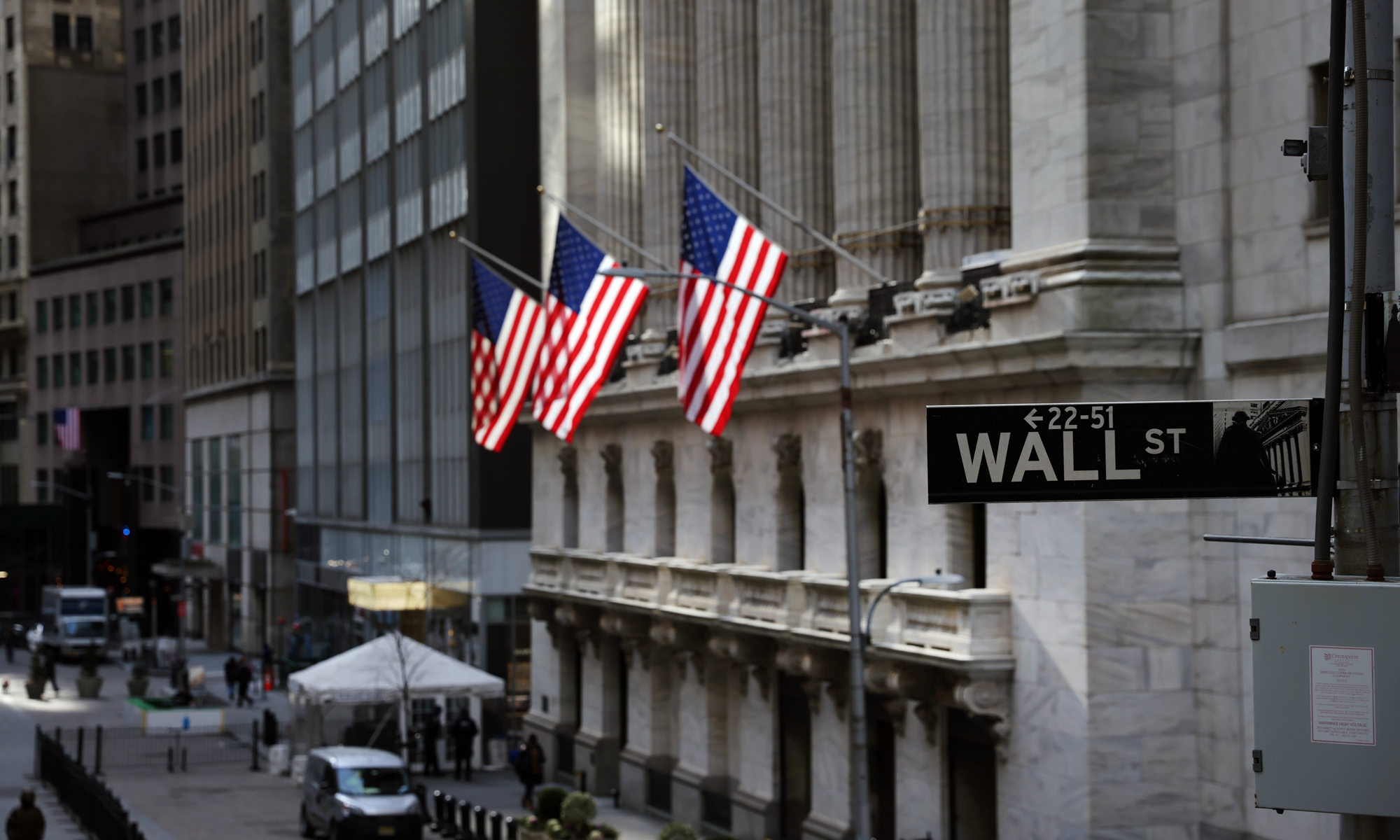
Wall Street Photo: AFP
Chinese companies that originally intended to go public in the US have canceled their plans and moved to seek IPOs in Hong Kong, industry insiders told the Global Times on Tuesday, citing the unfriendly environment that the US securities regulatory body has created for Chinese firms amid geopolitical tensions between the two countries.
China and the US should strengthen cooperation on cross-border regulation, but it needs to be made clear that China won't back down on bottom-line issues like key data utilized by some Chinese companies that is related to national security, they stressed.
The US has sent signals recently targeting Chinese firms planning to seek US listings, with the latest one requiring new disclosures.
The US Securities and Exchange Commission (SEC) started to issue new disclosure requirements to Chinese companies seeking to list in New York. Some Chinese companies have received detailed instructions from the SEC about greater disclosure of their use of offshore vehicles known as variable interest entities (VIEs) for IPOs, and the implications for investors and the risk that Chinese authorities will intervene with company data security policies, Reuters reported on Tuesday.
The chair of the SEC Gary Gensler said at the end of last month that he had asked staff to mandate certain disclosures from offshore issuers associated with China-based operating companies before registration statements can be declared effective. The US agency has stopped processing registrations of US IPOs and other sales of securities by Chinese companies, Reuters reported.
"The US move to enforce disclosure requirement around the VIE structure - having existed for years -- and reportedly halting IPO registrations, which seems to have been normalized, was not often seen in the past," Bocom International's managing director Hong Hao told the Global Times on Tuesday.
Bao noted that the tough stance the US regulator is taking at the moment could be intertwined with some non-regulatory factors like China-US geopolitical tensions.
There are 285 US-listed Chinese stocks with a total market value of approximately $1.76 trillion, of which more than 200 have adopted the VIE structure, data from financial data provider Wind showed.
A domestic investment bank insider, who asked to remain anonymous, told the Global Times on Tuesday that founders and investors of start-ups around him that originally intended to go public in the US have canceled those plans due to the US' tightening scrutiny and overall unfriendly environment toward Chinese firms.
Chinese listings in the US came to a standstill after the SEC freeze. No Chinese firm has held an IPO in the US since July 16, when Regencell Bioscience Holdings, an early-stage bioscience company, began trading on the NASDAQ board.
Numerous Chinese firms have reportedly suspended their US listing plans. Chinese on-demand logistics and delivery firm Lalamove was considering shifting its planned $1 billion US IPO to Hong Kong. Chinese fitness app Keep and the country's largest podcasting platform Himalaya have both dropped plans to go public in the US.
Chinese listings in the US have reached a record $12.8 billion so far this year, according to Reuters' Refinitiv data.
"For Chinese firms, there is no need to look only at the US for an IPO," Hong said. Except for some popular Chinese firms listed in the US, IPOs for other, smaller ones may not go smoothly, and they will face rising compliance costs as US regulations tighten.
In contrast, the Hong Kong stock market, albeit having experienced some setbacks including a recent slump of technology companies that are under a regulatory cloud, stands out for its rich liquidity, Hong noted.
"We should treat recent domestic regulatory moves in a correct way: taking precautions against hidden risks will benefit investors in the long term," he added.
In response to the US regulator's tightening disclosure for Chinese companies and concerns about China's regulatory actions, the China Securities Regulatory Commission (CSRC) said on August 1 that it will seek closer cooperation with its US counterpart and support overseas listings, underscoring that the two sides should uphold the spirit of mutual respect and strengthen communications on regulating China-related stocks.
The State Council, China's cabinet, on Monday issued guidelines, saying it would boost cross-border accounting cooperation, while also safeguarding its information security.
China has been tightening its regulation of overseas issues since it launched a cybersecurity probe of ride-hailing giant Didi Global last month, just days after its listing in New York.
"It's an inevitable choice for both countries to enhance communications on the overseas IPO issue, including negotiating relevant standards. But on some points -- like requiring Chinese firms to provide accounting documents and crucial data that is deemed to be highly related to national security -- that's our bottom line," said the investment bank insider.
Improving regulation standards for Chinese firms both listed domestically and overseas, while taking an open approach to companies' choices of listing venues, will be the trend for a period to come, analysts said.
The State Council also vowed to step up scrutiny of accounting firms engaged in listings and crack down on financial fraud.




